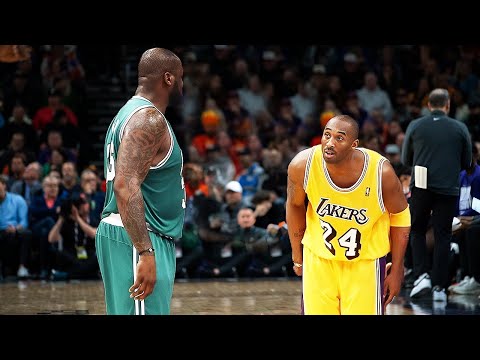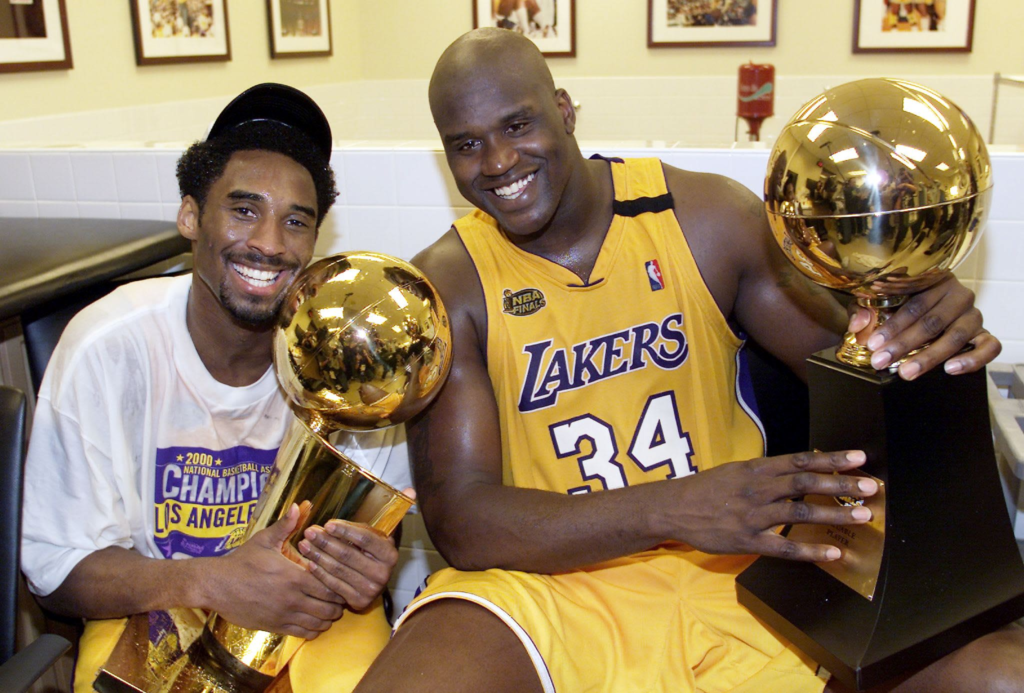The relationship between Kobe Bryant and Shaquille O’Neal is one of the most fascinating in NBA history. It was a complex mixture of mutual respect, professional rivalry, and personal friction, built around their time together on the Los Angeles Lakers. They led the Lakers to three consecutive NBA championships from 2000 to 2002, yet their partnership was famously fraught with tension. While both were immensely talented, their contrasting personalities and approaches to leadership often put them at odds. However, one moment stands out as the day Kobe Bryant definitively showed Shaquille O’Neal—and the basketball world—who was the boss.
To truly understand this day, we need to look at the dynamics of their relationship, the context of the era, and the moment when Kobe finally asserted himself.
Shaquille O’Neal: The Early Dominance
When Shaquille O’Neal joined the Lakers in 1996, he was already one of the most dominant forces in the NBA. Standing 7’1″ and weighing over 300 pounds, Shaq was an unstoppable physical presence on the court. He had speed, agility, and power that few, if any, could match. After stints with the Orlando Magic, where he had reached the NBA Finals but failed to win a championship, Shaq came to Los Angeles with the clear intention of capturing a title.
Shaq’s presence changed the trajectory of the Lakers immediately. He was the clear leader of the team and the face of the franchise. However, just a few months after Shaq signed with the Lakers, an 18-year-old Kobe Bryant was drafted. While initially a raw talent, Kobe’s work ethic, ambition, and drive quickly became evident.

Kobe Bryant: The Rising Star
Kobe Bryant, drafted directly out of high school, was a polarizing figure early in his career. He had a confidence and swagger that many found unusual for someone so young. He wanted the ball in clutch moments, he practiced with a level of intensity that was unmatched, and he wasn’t afraid to challenge more established players, including Shaq.
Bryant’s relentless work ethic began to show results by the 1999-2000 season. As his skills sharpened, he became the perfect complement to Shaq’s inside dominance. But while Shaq dominated the paint, Kobe’s shooting, footwork, and perimeter game flourished. Yet, the balance between the two stars was often tenuous. Kobe wasn’t content to just be the second option, and Shaq wasn’t ready to relinquish his position as the alpha.

The Tensions Between Kobe and Shaq
Their partnership was often described as a “feud” by media outlets. Shaq was more laid-back, enjoying the fame and celebrity life that came with being in Los Angeles. He would show up to training camp out of shape, relying on his natural ability to carry him through the season. Kobe, on the other hand, was the epitome of dedication. His work ethic bordered on obsessive, and he frequently criticized Shaq for not being as committed.
The public knew about their squabbles, with both players openly criticizing each other in the media. Shaq would call Kobe selfish and a ball hog, while Kobe accused Shaq of being lazy and not taking his conditioning seriously. Despite their bickering, they were still able to win three championships together. But cracks were forming, and both players felt the need to prove who was more crucial to the team’s success.

The Turning Point: The 2003-2004 Season
By the 2003-2004 season, it was clear that a power struggle was underway. Kobe Bryant was no longer the young prodigy playing second fiddle to Shaq. He had developed into one of the best players in the league and was ready to claim his status as the team leader. Shaq, however, was still a dominant force and wasn’t ready to step aside. The team was dealing with tension, and while they had acquired Hall of Famers Karl Malone and Gary Payton to bolster their roster, the internal discord was hard to ignore.
The pivotal moment that would forever define the dynamic between Kobe and Shaq came on March 5, 2004. In a game against the Sacramento Kings, Kobe Bryant dropped 36 points, but it wasn’t just the numbers that told the story. It was how Kobe dominated the game in a way that made it clear he was now the face of the Lakers.
Throughout the game, Kobe’s intensity was evident. He drove to the basket fearlessly, took over in clutch moments, and played with the unmistakable determination of a player on a mission. It was no longer about deferring to Shaq in key moments; Kobe demanded the ball, and his teammates—often loyal to Shaq—recognized that the balance of power had shifted.
Shaq finished the game with respectable numbers, but it was clear that Kobe was the main attraction. He carried the team to a critical win, and for the first time, there was a sense that the Lakers were now Kobe’s team, not Shaq’s. In the locker room, even though Shaq’s leadership presence still lingered, the other players began to acknowledge Kobe as the primary leader on the court.

Kobe’s Ultimate Triumph: A New Era for the Lakers
The Lakers would ultimately fall short of winning the championship that year, losing to the Detroit Pistons in the Finals. But the bigger storyline was the impending breakup of Shaq and Kobe. Shaq was traded to the Miami Heat that offseason, while Kobe signed a long-term deal to remain with the Lakers. The trade marked the end of an era but also the beginning of a new chapter for Kobe.
In Miami, Shaq would win another championship in 2006, but it was Kobe who cemented his legacy in the years that followed. He led the Lakers to two more championships in 2009 and 2010, solidifying his place as one of the greatest players in NBA history. During those title runs, Kobe showed he could carry a team without Shaq, proving once and for all that he was capable of being the alpha on a championship team.

The Legacy of the Kobe-Shaq Rivalry
While their relationship was rocky during their time as teammates, Kobe and Shaq eventually reconciled, recognizing that they had made each other better players. Shaq has often admitted that Kobe’s relentless drive pushed him to be better, and Kobe, before his tragic passing in 2020, expressed admiration for Shaq’s dominance during their championship years.
But the day Kobe Bryant showed Shaquille O’Neal who was the boss wasn’t just about a single game or a specific moment. It was the culmination of years of tension, competition, and growth. It was about a young player who wanted to prove that he belonged among the greats, not as a sidekick, but as a leader. Kobe eventually became the boss not only of the Lakers but of the entire league, earning a legacy that will be remembered forever.

